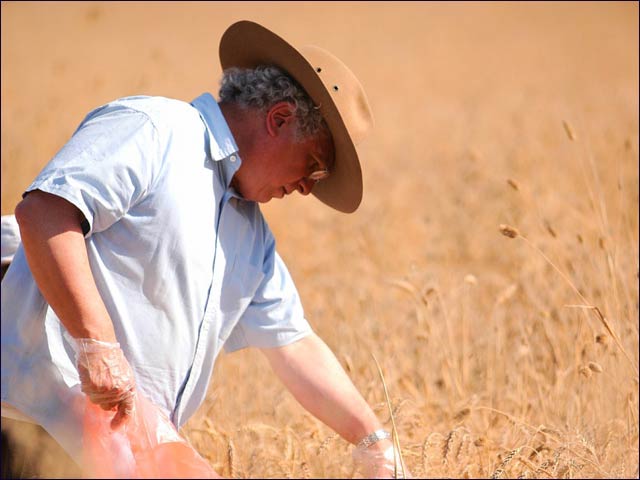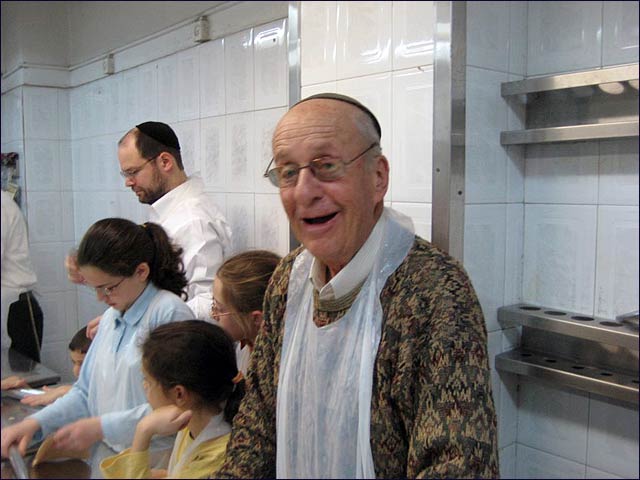Sandy Colb adores watching things grow, whether it’s his patent-law practice in Rehovot or the vegetables in his fields. His success in both ventures has in turn nourished his passion for feeding Israel’s hungry.
More than 20 years ago, Colb began giving away extra produce from his own vegetable patch. Today, his Tov V’Hameitiv Foundation runs a patchwork of 250 acres of owned, leased and loaned farmland yielding 100 tons a week of about 40 different fruit and vegetable varieties all year long -- citrus, pecans, avocados, peaches, plums, apples, root vegetables, leeks, cauliflower, broccoli, celery, eggplant, tomatoes, peppers, and more – for distribution through 70 social-service agencies.
Colb sits on the board of Leket, Israel’s national food bank, which handles some of the bounty and arranges for some 25,000 volunteers (many of them tourists) to pick crops in Colb’s fields every year. During the summer of 2014, when rocket barrages from Gaza kept volunteers from Rehovot, Leket sent its own employees to help harvest.
“We hope to increase our cooperation with Leket,” says Colb. “We hope to get groups of mentally, emotionally or physically challenged people to pick; they generally like working in the fields.”
Colb knows this because he already counts eight people with disabilities among his 60 paid workers. Most of the others are older Ethiopian Israelis who come to Colb’s fields from 6 to 10 in the mornings to pick or plant. “That’s a very important part of what we do,” says Colb, who throws an appreciation dinner each year for employees and their families, as well as employees of the agencies with which he works.

Sandy Colb in his wheat field Overseeing a thriving business and thriving farms is no easy task, especially considering that Colb travels extensively for business and pleasure. “I work 18 hours a day,” he says. “Two of those I spend on the foundation. I go out to the fields; I plant and pick vegetables with my own hands.”
Feeding a veggie habit
Colb was born in Cleveland in 1948 to Holocaust survivors. He moved to Israel in 1974 after completing Harvard Law School. He also holds bachelor’s and master’s degrees in physics from the University of Pennsylvania and a master’s degree from Cambridge University. Near each campus, he managed to maintain a vegetable garden.
“I would find a piece of land and start digging,” he says with a chuckle. “It’s wonderful to see stuff grow, especially big zucchinis. I have a picture of my older son, who is now 40, holding a zucchini that’s bigger than he is.”
The family had bought land in Rehovot on which to build a house and garden, and it wasn’t long before Colb acquired an adjacent plot to cultivate. As the crops began pouring in faster than the Colbs could eat or give away, a neighbor named Chana Lesser offered to take some of the produce for clients in the food-distribution program run by her employer, Ezer Mizion.
“When the winter came I had no tomatoes to give her, and she said people needed them. So a friend and I started going once a week to the wholesale market in Rehovot to buy and donate, loading up my Land Rover with veggies.”
Seeing that the need outstripped his farmlands’ capacity, Colb began adding more fields by leasing and persuading owners of unused or underused fields to allow him to restore the fields to cultivation. He is currently turning 50 acres belonging to the Weizmann Institute into a paradise of produce.
Colb’s biggest single plot is 350 dunams (more than 86 acres) owned by a philanthropic family in New York who leases it to him for $60,000 a year and then returns the money as a contribution. Aside from that, Colb picks up all expenses, from seeds to salaries.
“It just grew and grew, and it’s fun,” says Colb. “It’s expensive, but this is my veggie habit.”
The Rehovot municipality has long encouraged his efforts and gave him land for a greenhouse where he can grow vegetables especially during sabbatical years, when the open fields are not sown. (Field produce that ripens during sabbatical years is harvested and distributed through an arrangement called Otzar Beit Din so that no Jewish agricultural laws are breached.)
Colb says he does not plan to increase his farm holdings but does hope to double the yield from the existing fields by 2016, through more efficient management practices.
In addition to being a lawyer-farmer, Colb has also taught intellectual property law at Bar-Ilan University and Netanya Academic College, and he is chairman of the board of trustees at the Jerusalem College of Technology.

Sandy and Paula Colb invite friends to bake matzah in Jerusalem
using their homegrown wheat. Colb and his wife, Paula, have four children and 13 grandchildren, all of them in Israel. Each year before Passover, they invite a couple of hundred people to come to the Jerusalem bakery of the Karlin Hasidim to bake matzah using wheat from Colb’s fields.
The passage from the Passover Haggadah, “Let all who are hungry come and eat,” could easily be Sandy Colb’s motto.